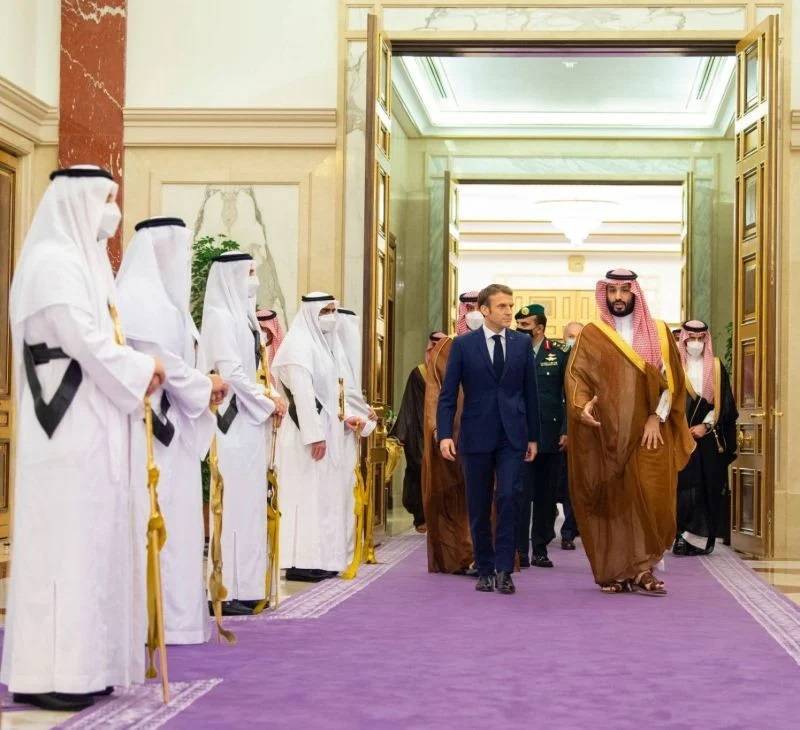
French President Emmanuel Macron met with Saudi Crown Prince Mohammad bin Salman on Saturday in Jeddah. (Credit: Bandar al-Jaloud / Courtesy of Saudi Royal Court / Handout via Reuters)
Want to get the Morning Brief by email? Click here to sign up.
France and Saudi Arabia announced that they had agreed on a “joint mechanism for humanitarian assistance” to Lebanon over the weekend, during French President Emmanuel Macron’s visit to the Gulf. However, they did not share any information about the details or whether the plan would entail a lifting of the Saudi ban on Lebanese imports. The move comes after Lebanese Information Minister George Kurdahi resigned on Friday, saying that it was at the behest of Macron as a way for the latter to open the door to talks with the Gulf states to resolve their diplomatic dispute with Lebanon. Macron, who is up for re-election in a few months, has made lessening Lebanon’s burdens a foreign policy priority for his administration, without much success. The partial Saudi opening comes following a three-way phone call on Saturday between Macron, Saudi Arabia’s de facto ruler Muhammad bin Salman and Lebanon’s Prime Minister Najib Mikati. The Saudis reportedly rejected a French proposal to have Mikati visit Jeddah for a trilateral meeting with bin Salman and Macron, but French officials told the Financial Times that Saudi Arabia agreed to redispatch its ambassador to Beirut. The Financial Times also reported that the Saudi gestures towards Beirut, just weeks after their foreign minister called engaging with the Lebanese government “not productive or useful,” were the price demanded for the first visit to the kingdom by a Western head of state since the Saudi government’s murder of journalist Jamal Khashoggi in 2018.
The joint Parliamentary committees will consider a new version of the long-delayed capital control law today, but the latest proposal has come under criticism as heavily biased in favor of Lebanon’s banks. Discussions planned for last Wednesday were postponed after Deputy Prime Minister Saade Chami informed the committees that talks with the International Monetary Fund were still ongoing. Article 8 of the draft law, which is being circulated online ahead of the session, will result in banks being exonerated from any previous legal disputes around transfers of money abroad. A recent statement by the Association of Banks in Lebanon welcomed “the new wise approach” to reforms of the new government, while reactions from legal and economic experts on social media have been largely critical. Economist Alia Moubayed tweeted, “This is heresy!” and questioned, “Where is the economic plan to restructure banks and the central bank and unify the exchange rate?” The Depositors’ Union has also released a letter condemning the draft. A recent report by Moody's has put the funds transferred from Lebanon between November 2019 and September 2021 at $9.5 billion.
Parliament will convene for a legislative session on Tuesday, with amendments to the World Bank loan agreement needed to get a long-delayed social assistance program up and running on the agenda. The bulk of the $246 million loan is earmarked to provide cash assistance to needy households. The loan was approved by the World Bank in January, and by Lebanon’s Parliament in March, but has been stalled ever since, in part because of amendments made by Parliament without approval from the World Bank. Parliament had been scheduled to resolve the discrepancies on Oct. 28, but the session was derailed by conflict over the electoral law and Parliament has not convened since. Lawmakers now have another opportunity to resolve what has become a nearly yearlong roadblock preventing badly needed assistance from reaching the struggling population. Thirty-five other items will also appear on the agenda Tuesday, among them a long-awaited law allowing families of students studying overseas to transfer abroad $10,000 from their Lebanese accounts to pay for the school year that started three months ago. While not on the agenda, President Michel Aoun said over the weekend that Parliament will soon decide whether to transfer the prosecution of politicians implicated in the Beirut port explosion probe out of the hands of Judge Tarek Bitar to the Supreme Council, a judicial body tasked with judging top officials.
The head of the Bekaa Farmers’ Association said he expects at least a 70 percent reduction in planting this coming season. The prices of inputs like diesel, seeds, fertilizer and treatments for crops have risen dramatically while at the same time farmers are experiencing severely restricted access to credit due to the currency’s collapse and the freeze in the banking sector. The value of fruit and vegetable crops produced in 2020 was already down 33 percent from 2019 levels, according to an analysis by the Lebanese Center for Research and Agricultural Studies. Lebanon has the highest proportion of cultivable land, per capita, in the Arab world according to USAID, and agriculture is a lifeline for large segments of the population. But the sector has been hammered by geopolitical, diplomatic and economic blows over the last two years. The agricultural crisis may further exacerbate the runaway inflation of consumer prices.
The Constitutional Council will meet this week to consider the Free Patriotic Movement’s appeal to overturn Parliament’s amendments to the electoral law. The amendments were passed by Parliament on Oct. 28, against Aoun’s objections, and became law without a presidential signature five days later. The president’s political party filed an appeal on Nov. 17 with a number of legal claims, among them that Parliament’s vote did not meet the constitutional criteria for an absolute majority when it excluded 11 deceased or retired MPs from its calculation of majority. The constitutional council has until Dec. 17 to render its decision. Interior Minister Bassam Mawlawi, the senior-most official with responsibility for elections administration, has insisted that his ministry will be ready to hold elections no matter which date is decided on by the council, although the fact that the Supervisory Commission for Elections has yet to be formed has caused alarm among some observers.